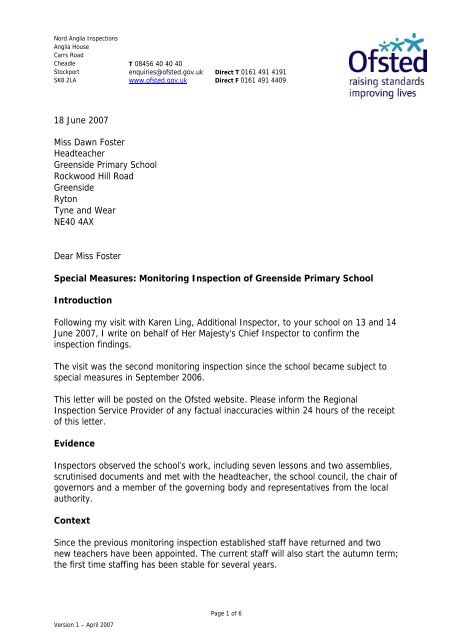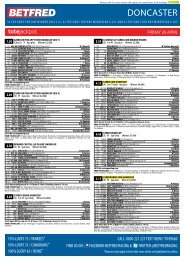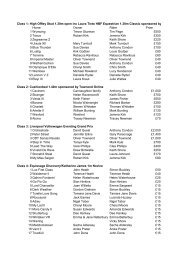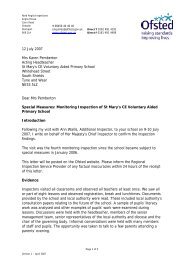18 June 2007 Miss Dawn Foster Headteacher Greenside ... - Ofsted
18 June 2007 Miss Dawn Foster Headteacher Greenside ... - Ofsted
18 June 2007 Miss Dawn Foster Headteacher Greenside ... - Ofsted
Create successful ePaper yourself
Turn your PDF publications into a flip-book with our unique Google optimized e-Paper software.
Nord Anglia InspectionsAnglia HouseCarrs RoadCheadleStockportSK8 2LAT 08456 40 40 40enquiries@ofsted.gov.ukwww.ofsted.gov.ukDirect T 0161 491 4191Direct F 0161 491 4409<strong>18</strong> <strong>June</strong> <strong>2007</strong><strong>Miss</strong> <strong>Dawn</strong> <strong>Foster</strong><strong>Headteacher</strong><strong>Greenside</strong> Primary SchoolRockwood Hill Road<strong>Greenside</strong>RytonTyne and WearNE40 4AXDear <strong>Miss</strong> <strong>Foster</strong>Special Measures: Monitoring Inspection of <strong>Greenside</strong> Primary SchoolIntroductionFollowing my visit with Karen Ling, Additional Inspector, to your school on 13 and 14<strong>June</strong> <strong>2007</strong>, I write on behalf of Her Majesty's Chief Inspector to confirm theinspection findings.The visit was the second monitoring inspection since the school became subject tospecial measures in September 2006.This letter will be posted on the <strong>Ofsted</strong> website. Please inform the RegionalInspection Service Provider of any factual inaccuracies within 24 hours of the receiptof this letter.EvidenceInspectors observed the school’s work, including seven lessons and two assemblies,scrutinised documents and met with the headteacher, the school council, the chair ofgovernors and a member of the governing body and representatives from the localauthority.ContextSince the previous monitoring inspection established staff have returned and twonew teachers have been appointed. The current staff will also start the autumn term;the first time staffing has been stable for several years.Version 1 – April <strong>2007</strong>Page 1 of 6
Achievement and standardsAt the time of the visit in January <strong>2007</strong>, there had been inadequate progress inraising standards overall and the school did not have a sufficiently accurate systemto assess pupils’ standards and progress.There has been an improvement since the previous monitoring inspection visit andprogress in these areas is now satisfactory. Whilst standards remain generally wellbelow the average in Key Stage 2, the progress pupils are making at both Key Stage1 and Key Stage 2 is now satisfactory.Led well by the headteacher, the school has responded very effectively to the needto have a reliable system of assessment. Pupils’ work and progress are now assessedand tracked comprehensively and regularly. The assessment of pupils’ standards ismoderated internally and externally to ensure its reliability. Teachers are now wellinformed about what pupils are achieving and the progress they are making, andthey use this information to guide their teaching. Pupils and parents and carers arealso informed regularly about the standards attained and the progress made. Asystem setting challenging targets, shared with pupils and parents and carers, is alsoin place and pupils are aware of their targets. These developments in assessmentand in sharing information are a significant step forward in assisting the school in itswork to raise standards.The overall progress pupils are making has improved since the previous monitoringinspection visit; they are now making satisfactory progress. However, the lowstandards many pupils are attaining in Key Stage 2 in particular remain a cause ofconcern for the school.Attainment in the Foundation Stage is satisfactory and children make satisfactoryprogress. The progress of pupils in Key Stage 1 is satisfactory. Judged by the qualityof pupils’ written work, lesson observations and teacher assessments, standards arebroadly average. The system for monitoring the standard of work and the progresspupils make is rigorously applied by staff. Staff plan lessons which meet individualneeds closely, although at times the more able pupils are not challenged sufficiently.The school now has a well informed view of the standards of individual pupils and ofclasses and key stages overall and is using this well to direct its resource to interveneto raise standards. The impact of this is evident in progress in Key Stage 2, whichhas improved and is now generally satisfactory. Nevertheless the standards manypupils attain remain below or well below what is expected. Many pupils in all classesin Key Stage 2 are reading and writing at a standard which is well below what isexpected. In mathematics pupils are also now making satisfactory progress overallbut many pupils’ attainment is well below what is expected. The progress of thedifferent groups of pupils - those with learning difficulties and/or disabilities, and theaverage and higher attaining pupils - is satisfactory.Page 2 of 6
The school is helping to ensure satisfactory progress for pupils and in the longerterm is positioning its work effectively to raise standards, by the introduction of itswell designed system of assessment and use of the information it provides, and in itseffort to improve the overall quality of teaching.Progress on the areas for improvement identified by the inspection in September2006• Raise standards in all subjects – satisfactory progressPersonal development and well-beingThe school has introduced a new approach to rewarding good behaviour and this isunderstood by pupils and they are responding to it well. The attitudes of pupils arepositive to their learning; they enjoy their lessons and behaviour is consistently verygood. The behaviour of pupils around the school is orderly; they are sensitive toothers, and courteous. The school council has an active role and representatives takeon responsibilities in a mature fashion. They speak positively about theimprovements made within the school. They feel the standard of their work is betterbecause lessons are more challenging. Attendance remains at close to the nationalaverage and is satisfactory; there have been very few fixed-term exclusions.Quality of provisionAt the previous monitoring inspection, teaching was satisfactory overall. The needwas to raise its overall quality to be mainly good in order to raise standards.Teaching and learning have improved and are now predominantly good. The goodlessons were well planned, met the needs of pupils well and held their interest. Anarea to develop in these good lessons is to take more opportunities for pupils to useinformation and communication technology. Teachers themselves used technologysuch as interactive whiteboards effectively to help pupils learn. The weaker elementsin lessons were occasionally insufficiently high expectations of the full range ofpupils, and a lack of helpful guidance for pupils to check the quality of their work.The use of assessment has developed well and teachers have access to a wide rangeof information which they use effectively to guide pupils’ work, and pupils havecurricular targets; these developments have helped learning to improve. Pupils nowneed to be reminded of their original targets more regularly to help them raise thestandard of their work. Teachers’ marking is usually commendably comprehensive.To help them to improve, pupils would benefit from more opportunities to respond tothe marking. The significant challenge in teaching and learning - to raise standardswhich are very low for many pupils - means that the school should not appoint newlyqualified teachers.The school has enhanced its provision in the curriculum by introducing sessions forguided reading and mental mathematics to improve basic skills. There is also a rangeof extra-curricular clubs which are led by staff and volunteers, with goodparticipation by pupils.Page 3 of 6
Leadership and managementAt the time of the previous monitoring inspection visit the headteacher had justtaken up her appointment. She is giving the school good leadership andmanagement. She knows the school’s strengths and weaknesses well and hasenergetically tackled important areas to bring about improvement. There is a need toformalise the system of self-evaluation and ensure more staff are involved in theprocess, and this is due to begin shortly. The headteacher has led the introduction ofan assessment system, which should help the school to continue to improve.Assisted by the governors and the local authority (LA), she has also led well inimproving the overall quality of teaching and learning. The monitoring of teachingand learning is carried out in conjunction with the LA. Appropriately, it is plannedthat the headteacher should take the lead in this area.The middle management of the school has been strengthened by a recent teachingappointment, which includes management responsibility. The new teacher has ledthe development of a consistent approach to behaviour, which has had an impact onimproving the school. The headteacher, the acting deputy headteacher and the newteacher with responsibility are now working strategically as a team. The actingdeputy headteacher has made a worthwhile contribution to the school’s improvementin her class teaching and the leadership role in numeracy. She will return to herschool at the end of this term.A significant area which remains to be developed, and is planned for the autumnterm, when staffing will permit it, is to establish leadership in all curriculum areas,including literacy. This will be an important management development in helping theschool to make progress on raising standards.The budget of the school is now balanced. It has also been expanded by a range ofother funding, including from the LA to help staffing. The extra funding has beentargeted well, for example in providing intervention and support to help targetedpupils to catch up.The governing body is developing its role well. It has continued to tackle staffingmatters effectively, and this has helped in raising the overall standard of teachingand learning to being mainly good. It has begun its gathering of first-hand evidenceof the work of the school to aid its knowledge and to help improvement. Thegovernors recognise there is a need to more consistent in the form of their reportson their visits and to be more evaluative. Nevertheless, some of the visits andreports have added usefully to the school’s improvement.There is a need now to ensure that progress on the areas for improvement is keptexplicitly to the fore in the agenda at governors’ meetings. The governing body isdue to conclude its training programme with work on self-evaluation and this isPage 4 of 6
helpful because they should also be involved in the school’s forthcoming updating ofits view of itself and its progress and what still needs to improve.Progress on the areas for improvement identified by the inspection in September2006• Establish clear and effective leadership at all levels to raise standardsand improve the quality of educational provision- satisfactory progress• Develop the skills of the new governing body so they can monitor thework of the school effectively, set a clear and achievable plan forimprovement and hold all staff accountable for standards – goodprogressExternal supportThe LA has provided the school with very good support. The extra funding and theexpertise it gives have helped the school to improve. The link adviser in her role asschool improvement partner has provided continuous and comprehensive supportwhich is valued and appreciated. The support from strategy consultants has also hadan effective impact on teaching and learning, especially through the rigorousanalyses of pupils’ performance in assessment events, shared with teachers inmeetings, and used by them consequently to guide the learning of pupils individually.The priorities and timescales set out in the improvement plans are being met. Thereis also a thoughtful approach to ensure that the LA support will continue, but theschool will demonstrate its growing self-sufficiency by taking the lead in severalareas.Main JudgementsProgress since being subject to special measures– satisfactoryProgress since previous monitoring inspection – goodNewly qualified teachers should not be appointedPriorities for further improvement• These remain those identified in the inspection of September 2006 andin the previous monitoring letter of January <strong>2007</strong>. In addition priorityshould be given to establishing the leadership of curriculum areas acrossthe school, to help the drive to raise standards.Page 5 of 6
I am copying this letter to the Secretary of State, the chair of governors and theGroup Director Learning and Children and Director of Children’s Services forGateshead.Yours sincerelyPeter HarrisH M InspectorPage 6 of 6







